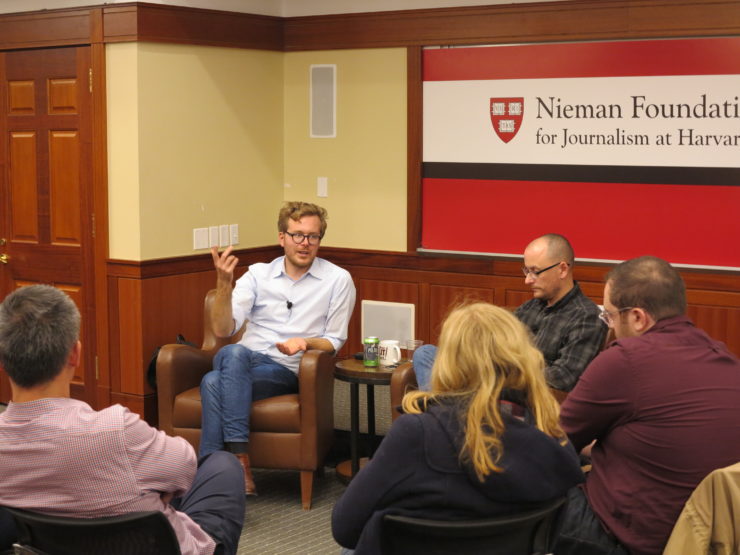
Süddeutsche Zeitung reporter Frederik Obermaier has noticed a deep impact in reader engagement after the Pulitzer-winning Panama Papers were published
In early November, close to 400 journalists in nearly 70 countries published dozens of stories about the offshore financial dealings of some of the world’s wealthiest individuals and biggest corporations. The stories drew on the Paradise Papers, a leak of 13.4 million documents associated with a Bermuda-based law firm.
Just as the Panama Papers had been in 2016, the Paradise Papers were leaked to Frederik Obermaier and a fellow reporter at the Munich-based newspaper Süddeutsche Zeitung. The International Consortium of Investigative Journalists (ICIJ) was a key partner in both projects, managing and analyzing massive amounts of data and coordinating communication between journalists.
After the Pulitzer Prize-winning Panama Papers stories were published, there was an uptick in circulation at Süddeutsche Zeitung. Where Obermaier, a 2018 Nieman Fellow, feels a deep impact from the project is in reader engagement. He gets many more emails now, many expressing appreciation for the level of reporting. One reader gave thanks by buying a classified ad: “Paradise Papers, thanks to everyone involved in the investigation and the publication.”
Obermaier spoke at the Foundation in November. Edited excerpts:
On Panama vs. Paradise papers
The Panama Papers data was from [law firm Mossack Fonseca], an offshore service provider that was set up by a German and by a Panamanian. The data we received was quite ordered. There was a folder for each offshore company. We went through all the documents in each folder and thereby got the whole history of an offshore company. All internal conversations, all their documents, everything scanned, everything fine. An investigative journalist’s dream.
The Paradise Papers consisted not only of data from one offshore provider but from two, plus the company registries of 19 tax havens. It was basically only a chaotic bunch of data. We had to find order. That was quite difficult. It was not that easy to find the story and to be sure that we had everything.
What was good for us, from a storytelling perspective, was that the Panama Papers mainly focused on individuals whereas the Paradise Papers brought up the topic of multinationals like Nike, like Apple. That made it easier for us to tell the story because we had a big fear that some readers might consider it as more of the same.
Mossack Fonseca was already considered a shady company before we published the Panama Papers. Appleby, the [Bermuda law firm] in the middle of the Paradise Papers, was considered a good guy.
The deeper we went into the data, the more obvious it became that they are not as good as they claim to be. They, internally, were well aware that they had certain problems, but until the Paradise Papers were published, nobody outside Appleby knew what was going on.
We thought the Paradise Papers would be like a hundred journalists working on it, but in the end it was nearly 400, and the more media outlets ICIJ involved, the more we found. The excitement really grew. For example, the Queen’s offshore investments was a story that came up only some weeks before publication. U2 frontman Bono’s investment in Lithuania actually became a good story, when we learned that there is an ongoing investigation.
On working with ICIJ
ICIJ’s expertise is really big. I think there is no media outlet worldwide that has its experience on how to process data, what you need, how to speed up things, how to share it.
That said, the whole process of working with ICIJ takes some time. In the case of the Panama Papers we started by approaching the director, Gerard Ryle. He came to Munich, had a first look at the data. Then the data team from ICIJ came to Munich. For the Panama Papers, they stayed nearly a week in Munich and ran the data through their systems to assess it and find out what data format is it, how could they open it. Some of it was encrypted.
Then you have still some months until they would invite the first partners. You have to run an optical character recognition program over documents so afterward you can search for words in them. In the case of the Panama Papers, that took us several months and it was dozens of servers that were working 24 hours a day, seven days a week.
Usually you meet several times with ICIJ. You then invite a core team of trusted media outlets. That’s normally the partners where ICIJ knows that they have the capacity to do preliminary research without knowing if it will ever become a project.
After that, you have a big meeting, where everybody who is invited to the project can take part. That was both times in Munich. That’s about 100 people, where you do a first presentation. Then ICIJ starts explaining how they would make the data accessible, what the security measures are, what the emergency plans are, what’s a possible publication date, knowing that it could later be postponed. That’s then basically a two‑day meeting where you set up groups for who is focusing on what.
On parsing complex documents
For each story, we went to numerous experts, because it’s not like you show it to an expert and he’s like, “Yeah, cool. That’s illegal, that’s legal. Here you go.” It’s more like, “Well, I’m sure on that part. That looks shady, but on that part I have no idea why they put that sentence, for example, in a contract. Ask my colleague who is working in Amsterdam. He worked in that field.” In the end I would guess, we approached about a hundred experts.
On the impact
The pessimist in me says there’s not that big a change, because we do see people that we saw in the Offshore Leaks in 2013. Then we saw them in the Swiss Leaks in 2015. Then we saw them in the Panama Papers and then again in Paradise Papers. You see them in every leak, and these are the names we now search in everything we get because there’s a high chance you will find them again.
The optimist sees that there is a certain fear now. Already in the Panama Papers we’ve found, for example, emails where they referred to previous ICIJ investigations.
Employees of Panama Papers law firm Mossack Fonseca for example informed their customers that they would have a “state-of-the-art” data center and that all communication is encrypted to “the highest possible security standards.” The firm also promised other clients that all the sensitive data is safe and that it will never leave Panama.
I think one outcome of leaks like the Panama Papers or the Paradise Papers is that nobody can feel safe anymore in tax havens. If you do hide something, I think now you realize that there’s a certain risk of a leak. If you do that business, you have to be very, very careful.
You do see the mechanisms already. In the Panama Papers we found guys who insisted on not putting their names in documents. One of them was called Harry Potter. They use these code names. One of my favorite lines comes from an email to “Winnie the Pooh”: “Regarding my meeting with Harry Potter…” You do see they are disguising, but I think that there’s always a way to find out if something is leaked.
On the value of collaboration
It helps to deal with some hundreds of journalists because it encourages you to go on. I normally have, after several weeks, reached a point of frustration where I would put a case aside and run the risk of forgetting it. If you then have a partner in Sweden or Spain who is asking, “Hey, I saw that you posted three months ago that you found that name. Did you follow up with that, because I had a look in the data, and I found this and that.” Then you get new energy to go on.
On maintaining secrecy
Everybody is aware of the risk and nobody wants to be the one putting the life of colleagues in danger, and furthermore, nobody wants to be the one ruining the whole project. If you are the one speaking too much and thereby make the investigation public, you have three or four hundred investigative journalists all around the world who will never work with you again.
The investigative journalism community is, in these times, very close. Everybody knows everyone, and everyone knows these rumors going on about colleagues who are not that good at keeping secrets, and you don’t want to be one of them, so that helps a lot.
The ICIJ continually sends weekly or monthly reminders out, stating warnings like “Please be aware of encryption. Here, again, if you need help, please inform us. We will set up a meeting with our IT guys to help you. If you do have problems, let us know.”
Then there are reminders of what to do when you lose your cell phone, when you lose your laptop, and stuff like that, so that in your mind, you constantly hear the voice of the head or the deputy head of ICIJ, Marina Walker, reminding you to be careful.


